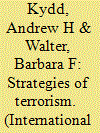|
|
|
Sort Order |
|
|
|
Items / Page
|
|
|
|
|
|
|
| Srl | Item |
| 1 |
ID:
138079


|
|
|
|
|
| Summary/Abstract |
This article investigates whether attacks against Israeli targets help Palestinian factions gain public support. We link individual-level survey data to the full list of Israeli and Palestinian fatalities during the period of the Second Intifada (2000– 2005) and estimate a flexible discrete choice model for faction supported. We find some support for the ‘‘outbidding’’ hypothesis, the notion that Palestinian factions use violence to gain prestige and influence public opinion within the community. In particular, the two leading Palestinian factions, Hamas and Fatah, gain in popularity following successful attacks against Israeli targets. Our results suggest, however, that most movement occurs within either the secular groups or the Islamist groups, but not between them. That is, Fatah’s gains come at the expense of smaller secular factions, while Hamas’s gains come at the expense of smaller Islamic factions and the disaffected. In contrast, attacks by the Palestinian Islamic Jihad lower support for that faction.
|
|
|
|
|
|
|
|
|
|
|
|
|
|
|
|
| 2 |
ID:
086006


|
|
|
|
|
| Publication |
2009.
|
| Summary/Abstract |
The purpose of this study is to explore the relationship between the secret negotiations and the public rhetoric of Palestinian and Israeli leaders leading up to the Oslo I Accords. To accomplish this goal, we coded public statements made by Israeli and Palestinian leaders in the months preceding the accords and the events that unfolded during the talks. We hypothesized that the Palestinian leaders, as nonstate actors, would engage in outbidding by showing a more aggressive, backward-looking orientation in public. Israeli leaders, as state actors, would engage in frontstage-backstage behavior and display a more balanced public rhetoric. The results showed that the Palestinians focused on justice issues framed as mistrust and backward looking. This public framing was associated with retreat in the private talks. In contrast, the Israelis switched between positively and negatively framed rhetoric with forward-looking and affiliative statements correlated with lack of progress and backward-looking and mistrust rhetoric associated with progress in the talks.
|
|
|
|
|
|
|
|
|
|
|
|
|
|
|
|
| 3 |
ID:
116339


|
|
|
|
|
| Publication |
2012.
|
| Summary/Abstract |
We examine and test the logic that outbidding among insurgent groups results in more suicide terrorism specifically and more terrorism of any type, which has become a popular argument in recent years. A global analysis of terrorism from 1970-2004 provides scant support for the notion that outbidding increases suicide terrorism. An extension of the argument to all types of terrorist attacks provides even less support. The logic of outbidding has received considerable attention in academic and policy circles in recent years. 1
Similar to the argument that democratic occupation increases suicide terror, 2 our lack of empirical support suggests that considerable cross-national work is still needed to understand suicide terror adequately. We suggest some reasons why this may be the case, drawing particular attention to the problem of overgeneralizing from a limited set of cases.
|
|
|
|
|
|
|
|
|
|
|
|
|
|
|
|
| 4 |
ID:
073825


|
|
|
|
|
| Publication |
2006.
|
| Summary/Abstract |
Terrorism is designed to change minds by destroying bodies; it is a form of costly signaling. Terrorists employ five primary strategies of costly signaling: attrition, intimidation, provocation, spoiling, and outbidding. The main targets of persuasion are the enemy and the population that the terrorists hope to represent or control. Terrorists wish to signal that they have the strength and will to impose costs on those who oppose them, and that the enemy and moderate groups on the terrorists' side cannot be trusted and should not be supported. Each strategy works well under certain conditions and poorly under others. State responses to one strategy may be inappropriate for other strategies. In some cases, however, terrorists are pursuing a combination of strategies, and the response must also work well against this combination.
|
|
|
|
|
|
|
|
|
|
|
|
|
|
|
|
|
|
|
|
|